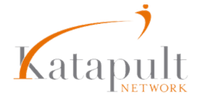Tips for Improving Body Language During Interviews
November 1st, 2023
At Katapult Network, we understand that people are more than just a resume and jobs are more than just a list of tasks. We're a recruiting company that takes a human-focused approach to the job search where we're able to match college graduates with entry-level, professional jobs. Whether you're a job-seeker looking to start your professional career or a hiring manger seeking to build your future leadership at the entry-level, we're excited to be your partner in navigating the search process.
In the competitive world of job hunting, your verbal communication skills are undoubtedly crucial, but don't underestimate the power of non-verbal cues. Your body language speaks volumes, often louder than words. During an interview, your gestures, facial expressions, and posture can either reinforce your words or send unintended signals. To make a positive impression, consider these essential tips for improving your body language during interviews.
1. Show Genuine Interest:
One of the keys to a successful interview is demonstrating your enthusiasm for the position and the company. Your body language should reflect genuine interest, conveying to the interviewer that you're not just there to fill a seat but are genuinely excited about the opportunity.
-Maintain eye contact: Establishing and maintaining eye contact shows confidence and sincerity. It demonstrates that you are engaged and actively listening. Be careful not to stare intensely, but rather, maintain a friendly and approachable gaze.
-Lean in slightly: Leaning forward slightly in your chair demonstrates attentiveness and interest. It conveys that you are actively participating in the conversation and eager to absorb information.
-Nod and smile: Non-verbal cues like nodding and smiling can convey agreement, understanding, and positivity. These simple gestures can create a connection with the interviewer and make you more memorable.
2. Control Nervous Habits:
Interviews can be nerve-wracking, and it's natural to display signs of anxiety. However, being aware of and managing nervous habits is crucial to maintaining a professional demeanor.
-Hand gestures: While hand movements can be a natural part of conversation, excessive or distracting gestures can be off-putting. Practice maintaining a calm and composed hand position, using gestures sparingly to emphasize points.
-Fidgeting: Nervous habits like tapping your foot or playing with your hair can be distracting to interviewers. Focus on keeping your movements controlled and deliberate. If you're prone to fidgeting, try to keep your hands on your lap or clasped together.
-Maintain good posture: Slouching or slumping can convey a lack of confidence or interest. Sit up straight, with your shoulders back, to project an image of poise and self-assurance.

3. Regulate Your Pace:
The speed at which you speak and move can significantly impact the perception of your confidence and competence. Striking the right balance is key.
-Speak clearly and deliberately: Rapid speech can make you appear anxious or nervous, while slow speech may suggest indecision. Aim for a moderate pace, enunciating your words clearly to ensure your message is easily understood.
-Control your gestures: Just as with speech, the speed of your gestures matters. Quick, erratic movements can be distracting, while slow, purposeful gestures can emphasize your points effectively.
-Be mindful of your walk: If you're asked to walk to the interview room or through the office, maintain a confident and steady pace. Rushing can make you seem flustered, while a slow walk may appear lethargic. Find a comfortable pace that exudes confidence.
Mastering the art of body language is a powerful tool in your arsenal for interview success. By showing genuine interest, controlling nervous habits, and regulating your pace, you can create a positive and lasting impression. Remember, your non-verbal cues speak volumes about your personality, professionalism, and suitability for the position. Practice these tips, and you'll be well on your way to acing your next interview.




